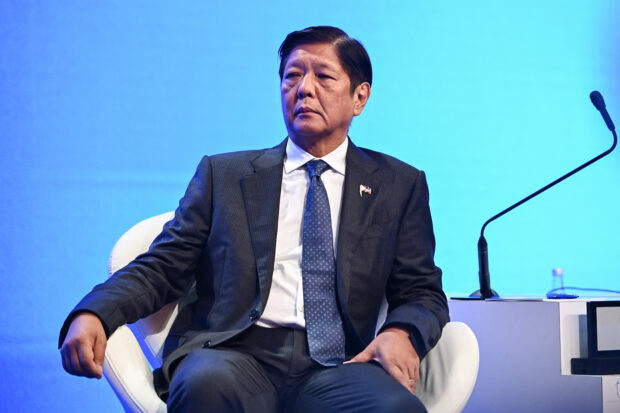Marcos: PH won’t yield West Philippine Sea; to defend it at all cost

Philippines’ President Ferdinand Marcos Jr. sits on stage during the 21st Shangri-La Dialogue summit in Singapore on May 31, 2024. (Photo by NHAC NGUYEN / AFP)
SINGAPORE – President Ferdinand Marcos Jr. on Friday said the Philippines would not yield and do “whatever it takes to protect our sovereign home” in the face of Beijing’s sweeping claims in the South China Sea, including parts of the West Philippines Sea.
Speaking at the Institute for Strategic Studies’ (IISS) Shangri-La Dialogue, Asia’s premier defense forum, the President said Manila’s claims in the South China Sea “are derived not from imagination, but from international law.”
According to him, the Philippines has defined its territory and maritime zones “in a manner befitting a responsible and law-abiding member of the international community.”
“Unlike others, we have submitted our assertions to rigorous legal scrutiny by the world’s leading jurists,” Mr. Marcos said, apparently referring to Beijing who has continuously refused to honor the 2016 ruling that invalidated its expansive claims in the South China Sea.
READ: Marcos forms body to beef up West Philippine Sea security
Article continues after this advertisement“In our solid legal footing and through our clear moral ascendancy, we find the strength to do whatever it takes to protect our sovereign home to the last square inch, to the last square millimeter,” he said.
Article continues after this advertisementThe Philippines, he said, would never allow anyone to detach the West Philippine Sea “from the totality of the maritime domain that renders our nation whole.”
“As President, I have sworn to this solemn commitment from the very first day that I took office. I do not intend to yield. Filipinos do not yield,” he said.
He said that the Philippines and like-minded nations are not mere bystanders to unfolding world events, saying that “we are the owners of the narratives of our regional community.”
“Thus, we reject any attempt to deny our strategic agencies, especially by forces that seek to subordinate our interests to theirs,” he said.
The world, he added, “must reject unjust narratives that seek to subsume distinct national interests into so-called ‘major country’ dynamics, which seek to impose hierarchy amongst nations.”
While he did not directly mention Beijing, the Asian superpower has received global condemnation for its growing aggression and militarization of the South China Sea, including harassing other claimant nations in the strategic waterway.
“Attempts to apply domestic laws and regulations beyond one’s territory and jurisdiction violate international law, exacerbate tensions, and undermine regional peace and security,” he said.
The region, according to him, could not afford any other future for the South China Sea other than the one envisioned by the Association of Southeast Asian Nations—“a sea of peace, stability, and prosperity.”
“Unfortunately, this vision remains for now a distant reality. Illegal, coercive, aggressive, and deceptive actions continue to violate our sovereignty, sovereign rights, and jurisdiction,” he said.
He assured the world that the Philippines is committed to addressing and managing difficult issues, particularly in the South China Sea through dialogue and diplomacy based on the 1982 Unclos and the binding 2016 Arbitral Award, which he said “provide a solid foundation for the peaceful resolution and management of disputes.”
“Our policy in the South China Sea is built upon these two touchstones,” he said.
The President admitted that China’s determining influence over the security situation and the economic evolution of this region “is permanent.“
“At the same time, the stabilizing presence of America is crucial to regional peace. It is never a choice. Both countries are important,” he said.
He pointed out that the strategic competition between the United States and China “is permeating the evolving regional landscape.”
Their rivalry, according to him, is constraining the strategic choices of regional states.
“Their contest is exacerbating flashpoints and has created new security dilemmas,” he said.
“The continued stability of this region requires China and the United States to manage their rivalry in a responsible manner,” he added.
He told the leaders and top officials that any effort to resolve maritime differences in the East China Sea and the South China Sea must be anchored on international law, particularly the United Nations Convention on the Law of the Sea.
“We need to begin by resoundingly rejecting misguided interpretations that paint our region as a mere theater of geopolitical rivalries,” he said.
For comprehensive coverage, in-depth analysis, visit our special page for West Philippine Sea updates. Stay informed with articles, videos, and expert opinions.